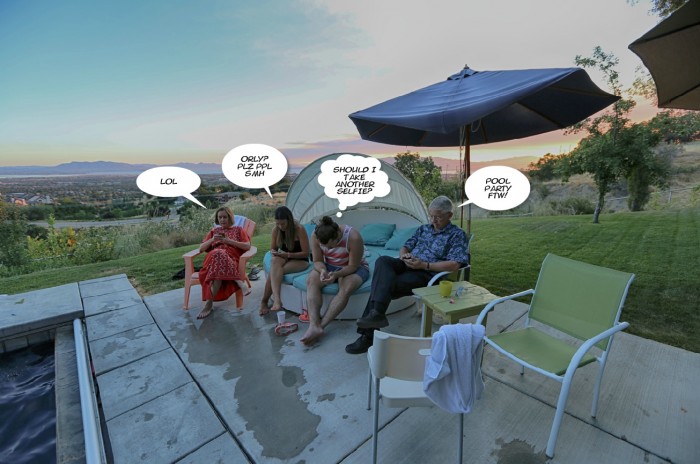
Our contemporary lifestyle is getting busier and busier, and our default mode these days is to cram our schedules full of stuff, juggling multiple-tasks at the same time.
The tech-crazed world that we live in makes it infinitely harder to switch-off, and finding quality time to think and relax often feels impossible. Today’s society looks somewhat like a zombie apocalypse, with fellow humanoids walking around looking down at little glowing screens. Even at a stoplight, I look around and can’t help but notice that everyone, immediately when they stop, reflexively looks down to their phones to check for texts and emails, and see what new ‘likes’ they have.
Tech is cool…until it eats your soul.
When asked what surprised him most about humanity, the Dalai Lama (supposedly) answered with this:
“Man. Because he sacrifices his health in order to make money. Then he sacrifices money to recuperate his health. And then he is so anxious about the future that he does not enjoy the present; the result being that he does not live in the present or the future; he lives as if he is never going to die, and then dies having never really lived.”
The irony of all this is that through science and progress, we’ve developed a way to contact each other beyond place and space, almost everywhere, but at the same time we’re causing a deterioration in quality human interaction and conversation, and also making our brains more and more distractible. What’s the cure for all this? Well, in my humble opinion, as a certified observer of humans (aka Board-Certified Psychiatrist), the cure is mindfulness meditation.
But really, what does sitting and breathing have to do with it?
To put it quite simply, to train the brain, and get it back to our default state of well-being that is inherent to every one of us. Meditation makes it so that we’re not hostage to our thoughts anymore. Incessant worry and rumination literally sucks the life out of us and keeps us at odds with not only ourselves, but with others as well. If our mind is always elsewhere, where the grass is greener, or even worse, replaying that stupid thing you said earlier, our brain is always going to be full of dissatisfaction. Why not nip that sh*t in the bud?
When we stop making our lives and our minds so busy, and switch to simply being still and aware, we can pay attention to our thoughts without judging them—without putting ourselves down because of some “right” or “wrong” way we’re supposed to be thinking or feeling.

“All of man’s difficulties are caused by his inability to sit, quietly, in a room by himself. “ ~ Blaise Pascal,
French mathematician
A wandering mind is an unhappy mind
Most of our waking moments are spent being lost in thought about completely unrelated things. Harvard psychologist and happiness guru Dan Gilbert recently tried to quantify this in a landmark study. They found that most of our moments are spent thinking about something unrelated to what you’re doing. The study concluded, “A human mind is a wandering mind and a wandering mind is an unhappy mind.” This is true even when thinking about something pleasant.
Remnants of day-to-day experiences get stuck in our minds, and we ruminate. Whether we’re thinking about the past or the future, or neither, distraction leads to unhappiness.
Meditation: An Rx for all the things
The scientific community has only scratched the cortical surface of how all this really works, but experienced meditators have a number of interesting and positive changes even in brain anatomy. Meditation also leads to less pain, less addiction, reduced irritable bowel syndrome, less stress, better coping skills, decreased anxiety, better quality of life, boosted immune system… the list goes on and on. There are even studies linking meditation and mindfulness to more compassion, better sleep, even feeling less lonely.
Maslow, the man behind the hierarchy of needs, said “the ability to be in the present moment is a major component of mental wellness.” The mind and memory need rest, and meditation is the deepest rest of all. So, we meditate to hear, see and feel more clearly. We meditate in order too learn to shut off the incessant noise (internal and external), and be present in the current moment. Believe it or not, our default state is positive feelings
How does “Mindfulness” play into all of this?
Meditation is a way to train ourselves to be more mindful. Thich Nhat Hanh, a poet, Zen master, and meditator extraordinaire, describes mindfulness as “keeping one’s consciousness alive to the present reality.”
Mindfulness is simply a way to describe that mental calm that we’re after, and the freedom that is inherent to the very nature of our minds. Mindfulness isn’t just thinking more clearly it’s experiencing more clearly.
To put it even more concretely, the goal of mindfulness meditation is to continuously be present and experience what is happening right in front of us, right now. It’s a gentle effort to bring our minds back to the present moment, and pay attention…on purpose. Left to itself, the mind has a tendency to wander off to all kinds of unpleasant places — depression, anger, craving, self-pity, wanting, regretting. And thoughts, as we all know, are tied to our emotions, and when we’re constantly caught up in negative thoughts and feelings, including stress, we suffer. And stress takes a serious toll on our bodies.
Meditation for the win.
This is the essence of waking up—putting our minds and bodies back together. Finding the fun in the dull, the novel in the familiar, the new in the old. Forget wanting and not wanting — let’s try to find pleasure in simply being alive.
When it comes down to it, it’s really about stopping the excess over-analyzing and over-thinking we all do, and tuning in to the present moment to both calm the mind and let our true consciousness shine through. Then we feel good.
And here’s the kicker: When we feel good, we treat others around us even better. And the cycle continues. Who would have thought that something as simple as closing your eyes could transform our world?
Relephant:
Mindfulness for Beginners: Dispelling 7 Myths of Meditation.
Author: Reid J. Robison, MD MBA
Editorial Apprentice: JoJo Rowden / Editor: Renée Picard
Images: author’s own









Read 2 comments and reply